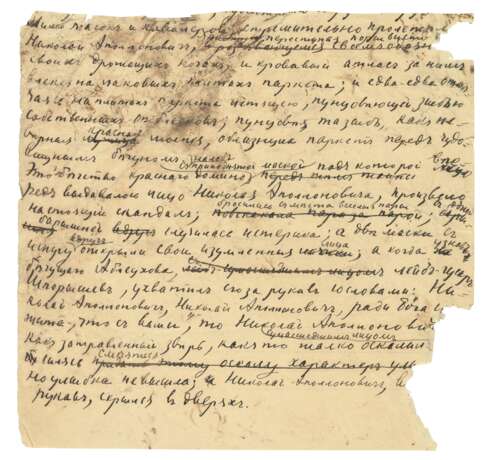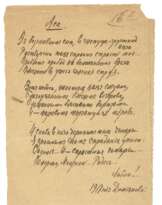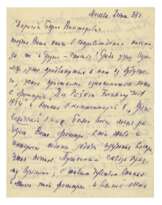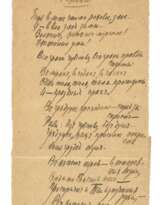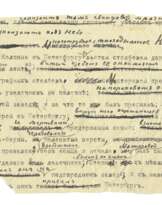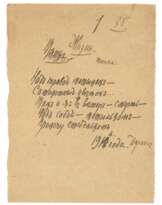ID 681129
Lot 13 | Andrey Bely (1880-1934)
Estimate value
£ 5 000 – 8 000
Compositional fragment from Petersburg. 1912
Autograph manuscript, part of the novel Petersburg, n.p., n.d. [1912-13] .
In Russian, a working manuscript with several authorial cancellations and emendations. One page, 210 x 215mm, cut down from a larger leaf. Provenance: Vasily Molodyakov (historian, b.1968).
Nikolay Apollonovich perestupal porivisto na svoix drozachix nogax k krovati atlas za nim …..A kogda uznal beguchego Ableuhova leb-gusar Shtolistevich, uhvatil ego za rukav so slovami : “ Nikolay Apollonovich, Nikolay Apollonovich, rad iboga chto s vami”, to Nikolay Apollonovich kak zatravlenniy zver, kak- to zalko oskalilsia. No ulibka ne vidnelasi, Nikolay Apollonovich kinulsia v dveri.
Nikolai Apollonovich stepped impulsively on his trembling legs to the bed…. And when the life-hussar Shtolishevich grabbed him by the sleeve with the words "Nikolay Apollonovich, Nikolay Apollonovich for God's sake, what's wrong with you?", Nikolay bared his teeth like a hunted beast. But no smile was visible, and Nikolai Apollonovich rushed through the door.
A fragment from the working manuscript of the great Russian Modernist novel. Bely’s second novel, Petersburg was first drafted in just a few weeks in 1912-1913 as a result of a moment of inspiration experienced while climbing the Great Pyramid of Cheops. The novel is set in Saint Petersburg at the onset of the 1905 revolution: its hero is the young Nikolai Apollonovich Ableukhov, and the main device of the intricate and at times surrealist plot is his attempts to escape from a promise to assassinate his own father, a prominent official. The characters include his disdainful beloved, Sofia Petrovna Likhutina, an alcoholic terrorist named Alexander Ivanovich Dudkin and even the Bronze Horseman statue in Saint Petersburg, which appears to Dudkin in a dream. The novel is widely recognized as the pinnacle of prose in Russian symbolism and Modernism in general: Vladimir Nabokov placed it next to Joyce's Ulysses as one of the great masterpieces of 20th-century prose, and in some respects, including Bely’s use of rhythmic prose (based on the anapaest) and the development of the city itself as a character in the novel, it may be said to anticipate Joyce’s novel.
| Artist: | Andrey Bely (1880-1934) |
|---|
| Artist: | Andrey Bely (1880-1934) |
|---|
| Address of auction |
CHRISTIE'S 8 King Street, St. James's SW1Y 6QT London United Kingdom | |
|---|---|---|
| Preview |
| |
| Phone | +44 (0)20 7839 9060 | |
| Buyer Premium | see on Website | |
| Conditions of purchase | Conditions of purchase |
